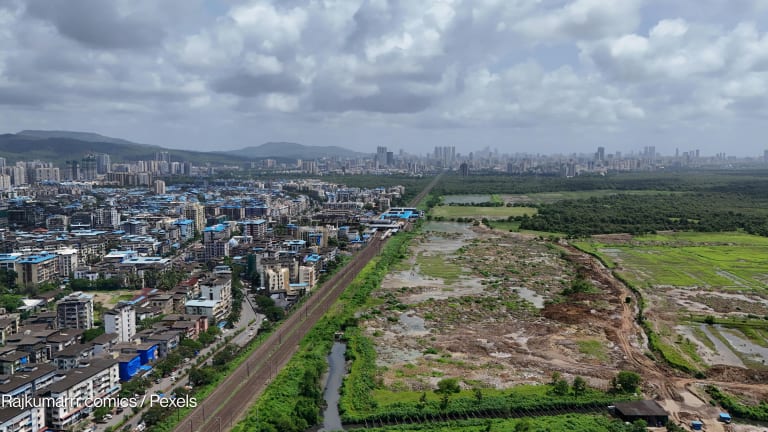New research asks: Is the humanitarian health sector prepared for climate change?

CANBERRA — The impact of climate change and a world 1.5 degrees Celsius warmer or above is already changing the face of humanitarian responses. By 2030, the price for climate-related humanitarian disasters could be $20 billion annually, the International Federation of Red Cross and Red Crescent Societies has predicted.
But how prepared are humanitarian organizations for the climate-related disease burdens that are emerging as a result of climate change, and likely to get worse?
The Centre for Humanitarian Leadership is asking that question, with the aim of ensuring the sector has the right knowledge and leadership to respond to increasingly urgent needs.
“The urgency is increasing,” Sonia Brockington, a lecturer in Humanitarian Health, said. “The pace and scale of climate change has far-reaching health implications — from the spread of new and re-emerging infectious diseases to escalating food insecurity, to the mental health impact on people who have lost their homes and livelihoods. As a result, the health needs of populations are becoming more complex, systems are being stretched, and hard-fought gains in health system improvements are being eroded.”
Report warns of the humanitarian cost of climate change
Two weeks on from Hurricane Dorian in the Bahamas, an IFRC report estimates the humanitarian costs of climate-related disasters could climb to $20 billion unless action is taken.
The need for a survey and research into the humanitarian health preparation for climate change is evolving due to the fact that humanitarian organizations see themselves as part of the core responders to climate change, Brockington said, through the vulnerable countries and communities they are supporting.
Collating the evidence
Climate change in health is a key priority for the agenda of the Centre for Humanitarian Leadership and its advisory board members who are based in Australia and internationally.
“Politically, this is a defining moment for the world and there is a recognition that it is a humanitarian issue,” Brockington said. “We need to address it as a sector.”
Despite there being a framework from the World Health Organization on climate resilience and cross-over with health standards for humanitarian practice, Brockington explained there is limited information collated about the internal changes humanitarian organizations are making to prepare for climate impact — including how leaders are prioritizing the issue.
Through a survey that will primarily be focused on the Asia-Pacific region, Brockington is aiming to get a sense of what agencies are already doing well and what may need to change and improve for the future. Understanding leadership is also a core priority.
“Leadership is something we want to get our head around and understand what the sector needs to do to improve, with climate-informed practice in mind,” she said. “It is an opportunity to find out what is happening in that regard and to document it.”
Among the issues Brockington expects leaders to be grappling with is the impact climate change will make on issues that are already posing challenges — including access to clean and safe water, availability of shelter, and increasing numbers of conflict.
“These will increase with climate change, so there is an even greater need for leadership in the humanitarian sector,” Brockington said.
But climate change also has the chance of causing noncommunicable diseases and heat stress to rise, which will add further burdens to the humanitarian system. And understanding how these are being taken into consideration is an important part of the study.
“I’m absolutely confident organizations are doing something, and this is an opportunity to document those,” Brockington said.
Outcomes and objectives
In consolidating and bringing together the information on how humanitarian organizations are responding to climate change, the research by Brockington and her team will aim to make recommendations around policy and practice — to be released early in 2020.
Training may also be a need emerging from the study, but Brockington said she wants to ensure an objective analysis of information is conducted before pre-empting findings.
Concentrating the survey and research on the Asia-Pacific region is partly due to a region where natural disasters are the norm — but also to work within resourcing capabilities. Insights from organizations outside the region are still welcomed, however, this early and exploratory research aims to broadly understand the innovation happening in the humanitarian sector.
Within the Centre for Humanitarian Leadership, the study and its results will support an increasing focus on climate change — and discussion it is aiming to create among the humanitarian sector. The Climate Change and Humanitarian Health Symposium, being held in Melbourne on Nov. 12, is another way they are bringing together and connecting leaders in this space to progress humanitarian health practice that is climate-informed and resilient. WHO, Global Health Alliance Melbourne, and Lancet Countdown on Health and Climate Change are among the participants in this discussion.
The results of the survey will encourage more engagement and discussion on an issue that Brockington believes should be at the top of humanitarian planning.
The Humanitarian Health and Climate Change survey is available online at centreforhumanitarianleadership.org/climate.
Search for articles
Most Read
- 1
- 2
- 3
- 4
- 5








